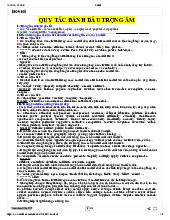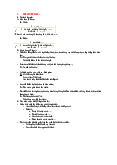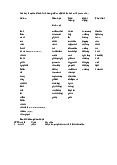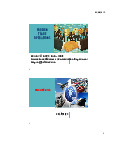


Preview text:
SELF-STUDY 1: Chapter 14 Review
1. During the job interview, do the interviewer and the interviewee want the same thing? How do their purposes differ?
The difference between an interviewer and an interviewee is their role during the interview process.
Interviewee: convince the employer of your potential, learn more about the job and the company,
and expand on the information in your resume
Interviewer: asses your abilities in relation to the requirements for the position, discuss your
training, experience, knowledge, and abilities in more detail, see what drives and motivates you, and
decide whether you would fit into the organization.
2. Briefly describe the types of hiring/placement interviews you may encounter.
Behavioral interviews focus on assessing the candidate's past behavior and how they have handled
specific situations in the workplace. The interviewer asks questions that require the candidate to
provide examples of their previous experiences, highlighting their skills and competencies. The aim
is to gauge how the candidate would respond to similar situations in the future.
3. Career coaches warn candidates to never enter a job interview “cold”. What does this mean,
and how can a candidate heed the warning?
"Cold" knowing little or nothing about the organization or position. Suggests no interest or too lazy
or unskilled to collect information.
Candidates should learn as much as possible on position before going for the interview, so they can
impress interviewers with their motivation, research skills, and enthusiasm for the position. Look for
information about organizations history, products, mission, goals, customers, competitors,
geographic locations, culture, management structure, reputation in the community, financial
condition, strengths and weaknesses, future plans, number of employees and names of leader.
4. What are success stories? And how can you use them?
A success story is a narrative that describes how someone or something has achieved success.
Success stories can be used to inspire and motivate others to achieve their goals by providing
examples of how success can be achieved. They can be used in a variety of contexts, such as:
1. Business and entrepreneurship - success stories of businesses and entrepreneurs can serve as
inspiration and provide valuable insights into what it takes to build a successful business.
2. Personal development - success stories of individuals who have overcome difficult challenges and
achieved their goals can inspire others to do the same.
3. Marketing and advertising - success stories can be used in marketing and advertising campaigns
to showcase the benefits of a product or service.
4. Education and training - success stories can be used in educational and training programs to
provide examples of best practices and success strategies.
Overall, success stories can be a powerful tool for motivation, inspiration, and learning.
5. Should candidates be candid with interviewers when asked about their weaknesses?
In my honest opinion if you have weaknesses that could possibly risk the safety of a nation you
should be honest about those weaknesses. If they are not too much of a risk then you do not have to tell everyone about them.
6. What are situational and behavioral questions, and how can you craft responses that will make
a favorable impression on the interviewer?
Situational questions are related to help employers test your thought processes and logical thinking.
You can prepare by having knowledge of the position and the company culture.
The behavioral questions are when they ask you to tell a story. You can respond by learning the
STAR technique: The Situation, Task, Action, the Result.
- Your first impression should consist of preparing for your interview, the actual interview itself,
and after the interview is over.
- The more confident and at ease. you feel heading into your interview, the better the impression you will make.
- Making a good first impression focuses less on your actual resume and qualifications, and more on
how you interact with the interviewer.
7. List the steps you should take immediately following your job interview.
- Write a thank-you message to each interviewer. - Contact your references.
- Follow up with a call if you hear nothing after five days.
8. How can you help your references provide the best possible recommendation?
Here are some ways you can help your references provide the best possible recommendation:1.
Choose the right references: Pick people who know you well and can speak to your skills and
abilities related to the job or program you are applying for.2. Provide your references with your
resume and cover letter: This will give them a better understanding of your qualifications and
goals.3. Give your references a heads-up: Let them know ahead of time that they may be contacted
and provide them with some details about the position or program.4. Remind your references of
your accomplishments: Refresh their memory of your achievements and successes, so they can
speak to specific examples.5. Communicate your goals: Make sure your references know why you
are applying for the position or program and what you hope to achieve. By following these tips, you
can help your references provide a compelling recommendation highlighting your skills and potential.
9. If you receive a job offer, why is it important to write an acceptance message, and what should it include?
It is important to write an acceptance message when you receive a job offer to formally accept the
job and show your enthusiasm for the opportunity. This message can also serve as a confirmation of
the job details and expectations.Your acceptance message should include your gratitude for the offer,
a confirmation of your acceptance, and any relevant details regarding start date or other logistical
information. You should also ensure that you have a clear understanding of the terms of the job offer
before sending an acceptance message
10. Is it a good idea to follow up after a job rejection? Why or why not?
It can be a good idea to follow up after a job rejection, but it depends on the situation. If you have
built a good relationship with the employer or the recruiter during the application process, it may be
appropriate to reach out and ask for feedback on how you can improve your qualifications for future
opportunities. However, if the rejection was due to a lack of qualifications or fit for the job,
following up may not change the outcome and could come across as desperate or pushy. Ultimately,
it's important to use your judgment and assess the situation before deciding whether or not to follow up.




